The Stages of Life
Often with a liberal arts education, the classes you remember most fondly—those that opened your mind to new ideas—were the classes not in your major. Classes on political philosophy, Victorian literature, volcanoes—whatever lit up new vistas for you. For so many, that life-changing experience was participating in theater, whether it was a class or a performance on the Chappelear stage.
 Attorney and novelist Michael Jordan ’76 says he drew liberally from his theater days at Ohio Wesleyan University to develop characters for his award-winning suspense novel The Company of Demons.
Attorney and novelist Michael Jordan ’76 says he drew liberally from his theater days at Ohio Wesleyan University to develop characters for his award-winning suspense novel The Company of Demons.
Retired state trooper Chris Villar ’93, likewise, used his directing and acting skills routinely to defuse potentially deadly situations during his career.
Litigation is theater.
Attorney Jacquie Jones ’96 appeared in two plays at Chappelear Drama Center, and what she learned from those productions helps her craft opening and closing arguments that help juries better understand her clients.
“Litigation is theater,” Jones says. “It’s about putting on a show and having a good memory and presenting it to a group of people who don’t know you or the other people involved.”
Over the years, alumni who performed under the Chappelear lights have come to realize that all the world really is a stage. And they credit the guidance and experience they received at OWU for giving them a good start in life after college—and for lasting memories.
Chappelear was their home away from the residence hall. They say professors provided personal attention, something that wouldn’t have been possible at larger universities.
“I transferred in my sophomore year to Wesleyan from Penn State University,” says Villar. “They have an excellent theater program as well, but I could very easily get lost in a big place like Penn State. But at Ohio Wesleyan and Chappelear, I got more individualized attention, more opportunities to act and learn and get into the scene shop and paint shop.”
Chappelear Community
Life lessons aside, Chappelear was a gathering place for community and at times a refuge for solitude. Eating lunch with friends in the lobby of the drama center. Hanging lights while navigating the facility’s overhead catwalk. Secretly washing clothes in the basement laundry. Catching much-needed rest, away from the din of Fraternity Row.
“I belong to a fraternity, and fraternities were well-known for being crazy on the weekends—and even during the week,” says Andrew Busch ’83, now a consultant. “A lot of times, I slept in the theater on those big, long, wide couches there because it was so quiet. It was such a resource for the theater community.”
For Jones, her dramatic turn at Ohio Wesleyan is unforgettable.
“It presented me with every opportunity to do everything I wanted to do,” says Jones, whose daughter, Zanirah Gordy, started at OWU this fall.
To commemorate the 50th anniversary of Chappelear Drama Center, OWU Magazine spoke with nine alumni who participated in theater but did not pursue a career in the entertainment business. We asked about their theater days and how that experience has shaped their personal and professional lives. The conversations have been edited for clarity and length.
Here’s what they had to say.
Derrick Robinson ’75
 Founder and president of People Against Covert Torture and Surveillance
Founder and president of People Against Covert Torture and Surveillance
MAJORS: Speech and theater
HOME: Twentynine Palms, California
OWU THEATER EXPERIENCE: Was a member of the ensemble in Edgar Lee Masters’ Spoon River Anthology.
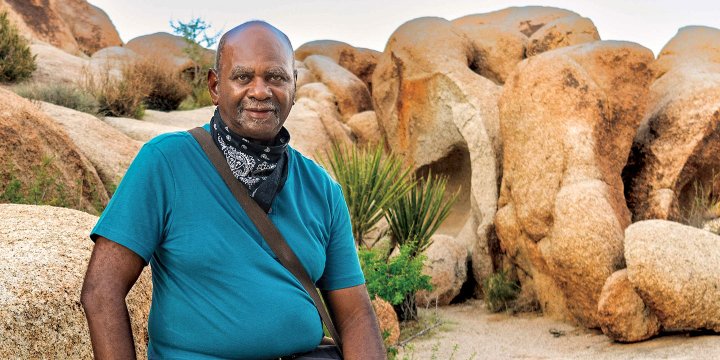
“Theater at Ohio Wesleyan was the prelude of what I’m doing today. I founded PACTS in 2016 to help people who have Havana Syndrome. [Havana Syndrome is a mysterious health condition with unknown causes experienced mostly abroad by U.S. government and military personnel.]
I use my theatrical skills working with groups of people to put on productions. I also produce programs for our (PACTS) YouTube channel.”

Andrew Busch ’83
Consultant specializing in economics and public policy. He has provided briefings to White House, U.S. House, and Senate staffs. He has also worked with a wide range of clients in financial services, energy, manufacturing, and construction.
MAJOR: Economics
HOME: Denver, North Carolina
OWU THEATER EXPERIENCE: Played Creon in Jean Anouilh’s version of Antigone and the doctor in the Steve Gooch play Female Transport. He also appeared in Shakespeare productions.
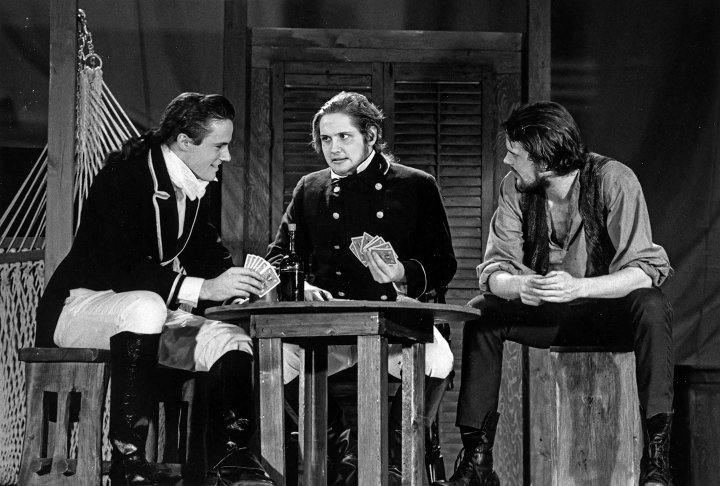
“My experience at Ohio Wesleyan, specifically in the Chappelear Drama Center, gave me skill sets I use to this day.
I understand how to do presentations that are engaging and fun. It has given me an advantage over the competition in finance, primarily because I can communicate effectively arcane topics and subjects in a manner that people can understand simply. That’s a wonderful gift that education and experience in the theater gave me.
On top of that, one needs to be creative. One needs to concentrate and focus and [theater training] gave me a wonderful advantage when I was a currency trader and in finance.
The ability to concentrate and focus for long periods of time was critical for being able to trade in the most volatile financial markets in the world. So my experience has just been fantastic.”
Michael Jordan ’76
 Attorney, arbitrator, and author of the novel, The Company of Demons, set in The Flats, a revived entertainment district along the banks of the Cuyahoga River in Cleveland, Ohio
Attorney, arbitrator, and author of the novel, The Company of Demons, set in The Flats, a revived entertainment district along the banks of the Cuyahoga River in Cleveland, Ohio
MAJOR: Politics and government
HOME: Rocky River, Ohio, and Longboat Key, Florida
OWU THEATER EXPERIENCE: Played a guard in the Grimm brothers’ fairy tale Rumpelstiltskin, a lover in Shakespeare’s A Midsummer Night’s Dream, and a small part in the production of Charly.
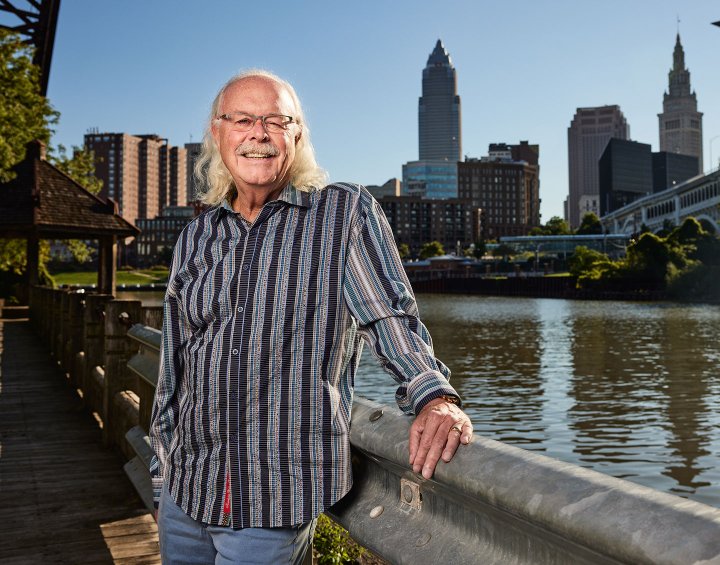
“I’m a trial lawyer. Having been in plays and theatrical presentations helped me plan how to present my case to a jury and then how to, particularly in opening and closing arguments, project my client’s position as best as possible.
As an author, the theater background was really useful in terms of developing characters. It helped me understand how to create characters. Just as an actor does on the stage, a writer must understand what motivates the character. What are the goals and what obstacles stand in the way? How will the character develop as a person?
The idea for my book The Company of Demons stemmed from actual murders committed years ago in Cleveland by a serial killer called the Torso Murderer. Some of his victims were found in the Flats, a now trendy entertainment nightspot in Cleveland.
Eliot Ness of The Untouchables fame moved to Cleveland to head the police and fire departments. Despite the authorities’ best efforts, the Torso Murderer was never apprehended.
My book asks: What if the killer might still be out there, and returned today for one final act of vengeance? [Demons was awarded the Gold Medal in the Florida Book Awards, a Silver in the Florida Writers Association Royal Palm Literary Competition, and was named crime thriller of the year by the National Independent Book Awards.]
I still work as an arbitrator, but my focus is shifting to writing and I’m now finishing a second novel.”
Rev. Erika Hewitt ’93
 Minister of Worship Arts for the Boston-based Unitarian Universalist Association
Minister of Worship Arts for the Boston-based Unitarian Universalist Association
MAJOR: Psychology (theater minor)
HOME: Bath, Maine
OWU THEATER EXPERIENCE: Participated in productions on stage and behind the scenes, including Speed the Plow by David Mamet and Shakespeare’s Love’s Labour’s Lost.
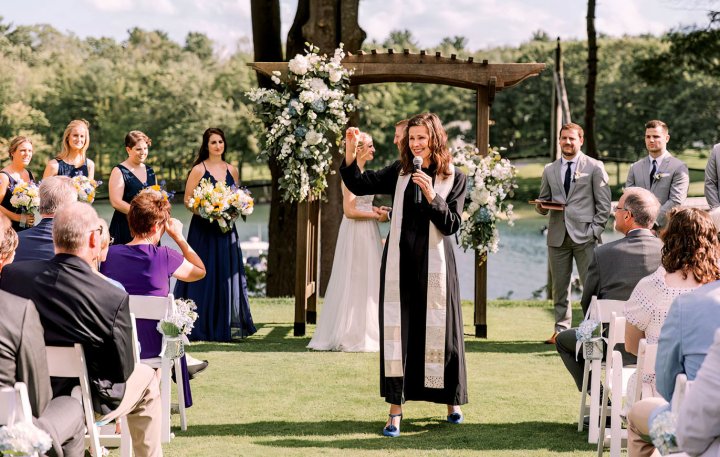
“I’ve been a minister/pastor for about 20 years. I also have a robust side ministry officiating weddings in Maine. In both of these strands of ministry, I constantly draw from my theater and acting training at OWU. It’s what makes me effective in these roles.
I even hear the voice of [Emeritus Professor of Performing Arts] Bo Rabby in my head sometimes.
Bo taught me a lot about delivery and the comprehension from the audience as it relates to diction. For example, emotion is carried in the vowels. If audience members can’t see your mouth, they’re not going to comprehend as much.
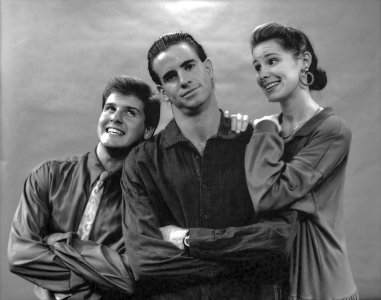
I remember we were in the main studio room of Chappelear rehearsing Speed the Plow. I happened to be wearing cowboy boots that day. Bo said to me ‘Erika, do you realize you are walking and carrying your body completely different? I think it’s because you’re wearing those red cowboy boots.’
I was like, wow, that’s absolutely true.
Another time, this visiting acting professor had us take turns moving across the room, leading with a different part of our body: your heart, your pelvis, your cerebral cortex. Just to understand the physicality of being in front of people is something that absolutely translates to a congregation and to weddings.”
Christopher Villar ’93
 Retired Connecticut state trooper
Retired Connecticut state trooper
MAJOR: Theater arts
HOME: Torrington, Connecticut
OWU THEATER EXPERIENCE: Lighting designer for the Irish playwright Brendan Behan’s The Hostage. Stage manager for Kiss Me Kate, a joint production with the Music Department.
“I learned about what people were saying as opposed to what they really meant. When we’re acting and directing, there are lines that are spoken by a character, but what they’re really trying to say is something else.
I used that all the time throughout my career.
Somebody would tell you something, but you knew they were trying to tell you something else that they were afraid to say or couldn’t say in front of someone.
I learned what certain facial gestures meant. I learned what certain hand and body motions meant through dance class. Through directing or acting, you could see how a person’s body was responding and what that meant. And to be perfectly honest, sometimes that saved me from a lot of fights as a state trooper.
Then other times, I was able to sense there might be more to the situation than what was [going on] right then.
The other thing acting class taught me is how not to appear afraid. I don’t like to admit it because I’m a state trooper, but there were times when things were a little bit hairy, and you push through, but you never let them see that.”
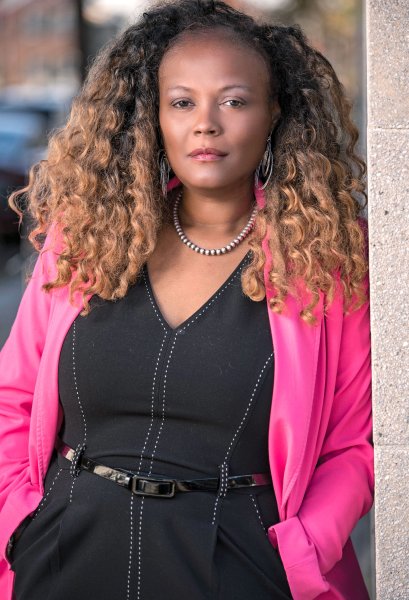
Jacquie Jones ’96
Attorney specializing in family, estate, and criminal work
MAJOR: Politics and government
HOME: Boothwyn, Pennsylvania
OWU THEATER EXPERIENCE: As a freshman, she and her roommate tried out and landed parts in a play, “which is funny, because it was set in Ireland. Not a whole lot of Black girls in Ireland.” As a senior, she participated in the all-Black production of playwright George C. Wolfe’s The Colored Museum.
“Litigation is theater. It’s about putting on a show, and having a good memory, and presenting it to a group of people who don’t know you or the other people involved.
Even when I’m writing opening and closing statements, even when I’m sitting next to my clients, I am always trying to show them with my actions and my words what I want to convey.
Any good lawyer has to be a good actor.”
Taylor McCleneghan ’02
 Owner of her own clothing line, Taylor Tall, and a product development consulting firm, Small Shop LLC, in Park Ridge, Illinois
Owner of her own clothing line, Taylor Tall, and a product development consulting firm, Small Shop LLC, in Park Ridge, Illinois
MAJOR: Fine arts with minors in theater, sociology, and French
HOME: Park Ridge, Illinois
OWU THEATER EXPERIENCE: Worked on the stage crew and costume crews. Designed costumes for the three-part mixed-media production of composer Ira Glass’ The Photographer. Created artwork for the marketing and worked on costumes for the production of Abundance.
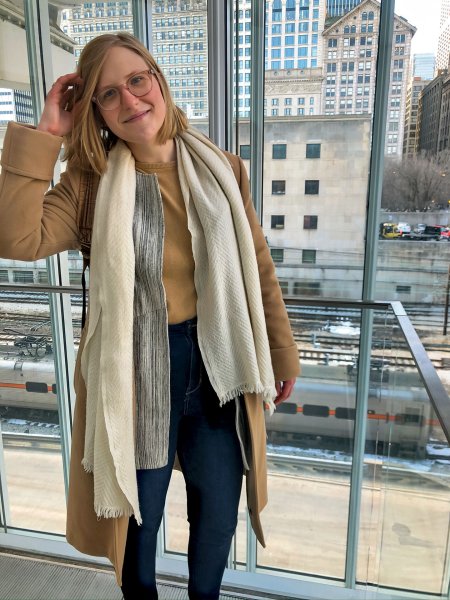
“Constructing period-appropriate costumes for The Photographer propelled my interest and appreciation and passion for well-made garments and the time it takes a maker to create a beautiful piece. It wholeheartedly has driven me to the hard work of starting a business (for women and individuals who identify as women).
I design custom-made clothing for women who are about 5’9” and taller. Our average customer is about 6’1”.
Constructing garments or fit directly for a specific actor helped further hone my skills. It helped me learn to fit a garment to an individual’s body build. You’d get a list of the actors, and then you’re creating and sewing the garment from scratch. You’re taking someone’s body measurements, determining and making a first round of the garment, fitting it to them, then making another round of a closer fit.
The practice I used working on shows at Wesleyan I use now in my career.”
Luke Lindberg ’93
Digital Media Director at BrickStreet Creative LLC, a marketing, graphic, and website design agency in St. Louis. He has worked with startups and large corporations to develop and market their products and services.
MAJOR: Fine arts and theater
HOME: St. Louis, Missouri
OWU THEATER EXPERIENCE: Played the king in the musical Once Upon a Mattress. Played Helen Keller’s brother in The Miracle Worker. Participated in a production of An Evening with Samuel Beckett.
“Theater gave me training and introduced me to the business side of being an actor. It prepared me for being a co-founder and director of Flux Art/Theater. The classes I took with Bo Rabby prepared me to take on the role of director and make artistic decisions for the season.
Also, producing Festus, my senior theater project, gave me the experience of creating our own experimental theater. It was the pre-flight training wheels for what became Flux later in our lives as we moved to St. Louis.
These days, I work for a marketing agency called BrickStreet, where I’m the digital media director. We do graphic, web design, marketing consultancy, as well as social media.
I’ve worked on the official media guide for the St. Louis Cardinals. We’ve also done a lot of work for [financial services firm] Edward Jones in St. Louis. They’re one of our major clients.”
Dr. Rachel Spetrino McCoy ’11
 Pediatrician at Stanford Children’s Clinic in Klamath Falls, Oregon
Pediatrician at Stanford Children’s Clinic in Klamath Falls, Oregon
MAJOR: Neuroscience and theater
HOME: Klamath Falls, Oregon
OWU THEATER EXPERIENCE: Appeared in a number of productions. Played Cousin Fan in the production of Mame; was stage manager of Nightwatch. Directed a production of Home Free by Lanford Wilson for her senior project.
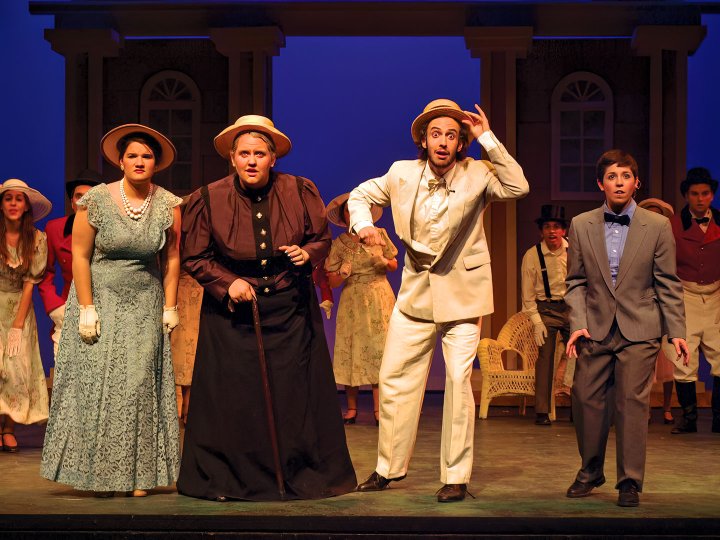
“Theater was something I had always done for fun growing up. When I got to Ohio Wesleyan I was pretty set on doing a science track and going to medical school, but then I took [Emeritus Professor of Performing Arts] Bonnie Milne Gardner’s freshman honors tutorial about women playwrights. After that, I was hooked.
I know how to work with lots of different people because of my theater days. Working in theater, you are able to problem-solve and be creative.
As a pediatrician, there are a lot of times where you have to creatively problem-solve. I’m able to help families take care of toddlers, get toddlers to eat their food and get their shots, and take the medicine they need.
Also, while I was a medical student, I was able to serve as a dramaturge for two productions that had to do with medicine. [A dramaturge is a literary editor on the staff of a theater who consults with authors and edits texts.] So, I was able to teach the actors and the directing staff about mental health when a production of Next to Normal was done in a community theater and then do the same thing when a production of Rent was done.”
Written by Tammy Joyner ’81, a writer and journalist in Greater Atlanta.
